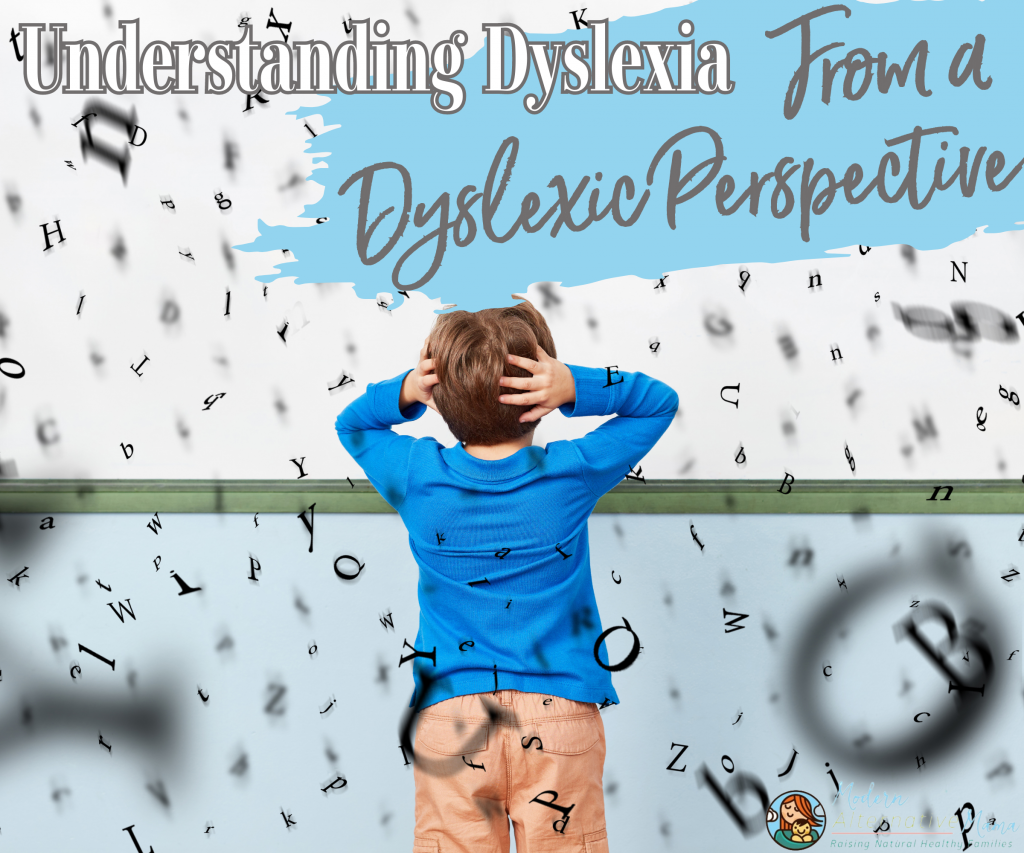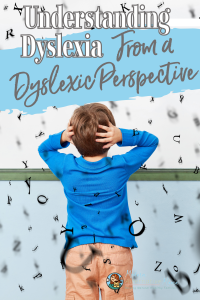As a young child, sometime between five and seven years old, I was diagnosed with dyslexia. Growing up, I never understood the diagnosis, as it was never explained. I had no interventions or extra help to correct or even understand and cope with the problem. I honestly didn’t even know what the problem was. I was just given an IEP for time and a half while testing and frequent breaks, which was used until the day I graduated.
During my public school career, my favorite subjects were math and English. I was a math wiz, a strong writer, and a decent reader. The only issue I had with reading (that I noticed) was I had to read everything twice to fully comprehend what I was reading. I didn’t learn to read late and enjoyed reading in my free time, at my own pace; I just wasn’t a fan of reading aloud.
I remember being in class, going around the room, and taking turns reading aloud. Those days always made me anxious. I would count how many students were ahead of me and quietly practice reading my paragraph, ensuring I wouldn’t make mistakes. That meant I didn’t pay attention to any paragraphs before my turn, often leaving me lost and lacking comprehension. Later on, I learned that was a trigger of my dyslexic disorientation.
Understanding Dyslexia
I learned about dyslexic disorientation from the book, The Gift of Dyslexia. This book not only shaped my understanding of dyslexia but transformed my learning disability from a weakness to a strength. I highly recommend this book to anyone with a dyslexic family member. So what exactly is dyslexic disorientation?
Dyslexic disorientation is a state of confusion that causes dyslexic people to experience distorted perceptions (1). Distorted perceptions can look different for everyone.
For some dyslexic people, the letters are constantly flickering around, and for others, the letters seem jumbled together (my distorted perception is jumbled). Here’s an example of distorted perception. These distorted perceptions make dyslexic people more susceptible to making mistakes in reading or spelling.
Every dyslexic person has a different confusion threshold; some are lower than others. A dyslexic person with a higher threshold is less easily confused and less frequently disoriented. This is why some dyslexic people can read and spell decently and slip through the cracks of public schools. It’s almost as if they’re high-functioning dyslexics.
But what triggers dyslexic disorientation?
Dyslexic disorientation is often triggered by words, specifically trigger words. There are over 200 trigger words; a complete list can be found here. Trigger words cause the most confusion for dyslexic people and are commonly used words, like “it” and “the.” Most dyslexics can read long words but struggle with or completely skip over these simple words because we think in pictures, also known as a pictorial flow.
In other words, we can picture things like a hippopotamus in our head but cannot associate an image with the words “it” or “the.” Dyslexic people may see the sentence “We saw the hippopotamus at the zoo” and read it as “saw hippopotamus zoo,” which makes no sense.
Associating an image with trigger words enhances pictorial flow. Some dyslexic people correct this problem through the Davis Symbol Mastery process, which engages creativity to establish an associated picture (sculpted in clay) with each trigger word (2).
Aside from trigger words, additional dyslexic disorientation triggers include (1):
- Not enough rest
- Poor diet or not enough food
- Illness, pain, or injury
- Drugs or medicines
- Print size too small
- Print too faint
- Varying print styles and typefaces
- Loud noises
- Specific sounds
- Certain smells
- Poor lighting (can be too much or too little)
- Excess motion (whirling fans, dangling decorations)
- A change in the orderliness of the environment
- Furniture rearrangement
- Moving households
- Scheduling changes
- Time pressure (being rushed)
- Threats of punishment
- Family strife
- Fear
- A loss
- Anything that is a reminder of an unpleasant past experience
In my experience, understanding dyslexic disorientation and triggers has been game-changing. Knowing what I need and understanding how I get from one state of mind to the next has helped me understand not just my dyslexia but myself as a person. It has opened up doors for communicating and understanding that I missed out on the first 29 years of my life.
My Dyslexic Experience
If I had known about trigger words and dyslexic disorientation earlier in life, I would have had a much easier time expressing my wants and needs. All through school, I thought dyslexia had to do with mixing up numbers, which made no sense, considering I was tutoring college students in math while in high school. It wasn’t until I was 29 that I understood what dyslexia was and learned that dyscalculia and dyslexia are two different things. It was also around that age that I suspected I had an auditory processing disorder.
Unfortunately, for many, myself included, dyslexia impacts more than reading and writing. Dyslexia also impacts my ability to communicate with others. For instance, when I am having a spoken discussion with someone, I try to envision their every word, but that can be difficult if they use many trigger words. Another trigger for me is dead spaces, like when someone says “um” or “uh.” After a few rounds of triggers, chances are I am no longer listening (and not by choice).
Throughout most of my life, I struggled with authority figures. I always felt people spoke down to me for one thing or another. I had teachers belittle me, calling me “stupid,” “retarded,” and the one that still haunts me, “their worst student.” Bosses told me, “You will never succeed in life,” and “It shouldn’t be so hard for you to understand unless you are stupid.”
Throughout my school and work careers, I’ve always found working in groups difficult, but I didn’t understand exactly why until I learned more about dyslexia. When I am learning something new, I like to move at my own comfortable pace. I do not like to be rushed and enjoy independently researching without depending on others to help or understand my learning techniques.
When I am learning from others, I ask a lot of clarifying questions. I like to ensure I have a complete understanding before moving forward. At school and work, authority figures often took my learning style as me being condescending, even stupid. The reality is I simply do not like redoing things I already did, as it leaves me feeling as if I failed. Failing makes me feel less than others and is often triggering. I rather have a complete understanding the first time. I am a very organized, precise person who plans everything; when those techniques are removed, I become disoriented.
Dyslexic disorientation doesn’t just go away when the words do. When I am in a state of dyslexic disorientation, I lose all self-confidence. I genuinely believe I am stupid. I feel inadequate and remember the unkind words I’ve repeatedly been told throughout life. I become confused, leading to stress, anxiety, anger, and resentment. I feel backed into a corner, stuck, sometimes for days feeling like a small, helpless child whose voice cannot be heard.
When I first started learning about my dyslexia, I was ashamed. Granted, I did have a very bad experience in the workplace, where I was ridiculed and shamed for my dyslexia. I was told I was a horrible writer and shouldn’t have been in a writing position. Although none of these statements were true, the experience was traumatic and put me in a state of dyslexic disorientation for months.
After so many years of belittlement for a condition I didn’t even understand, it took a lot of unlearning. I had to teach myself that dyslexia is not a weakness and that I am not stupid. I never was stupid. I just struggled at the hands of others because they (and myself) didn’t understand what I needed, but today I do.
Today, I have no shame in disclosing my dyslexia, not to friends or in the workplace. It’s actually one of the first things I do to enhance my communication skills with others. I find disclosing and discussing my dyslexia allows them to understand my learning style, which is often very different from theirs (and that’s okay).
I am lucky to have amazing people surrounding me at home and in the workplace. My bosses understand my dyslexia and the challenges that come with it. They understand my learning techniques require visual and spoken direction and accommodate those needs without making me feel inadequate or a burden. They understand I ask a lot of questions, sometimes the same questions in different ways, to ensure I understand what is expected of me. They understand that I do not work like everyone else but know they can count on me to finish the job on my own time.
If you or a loved one has dyslexia, check out our blog, How to Support A Loved One With Dyslexia. Remember, dyslexia is not a weakness. The gift of dyslexia opens up a new world of skills that a neurotypical person doesn’t have. Every dyslexic person has strengths and weaknesses, but we cannot hone in on the weaknesses while dismissing the many strengths of dyslexia. Our way of learning and understanding is unique but not hindered.
My dyslexic diagnosis has helped me hone in on my strengths instead of dreading my weaknesses, which has been my number one coping mechanism. Knowing and understanding trigger words, I can avoid them while writing, enhancing my pictorial flow. By doing this, I enhance my storytelling capabilities in ways many others cannot, which has tremendously helped my writing career.



